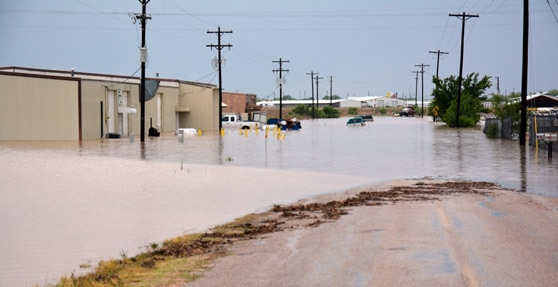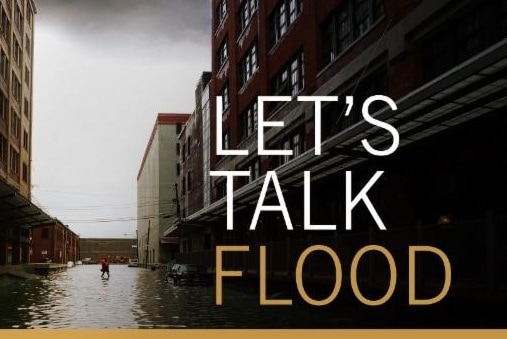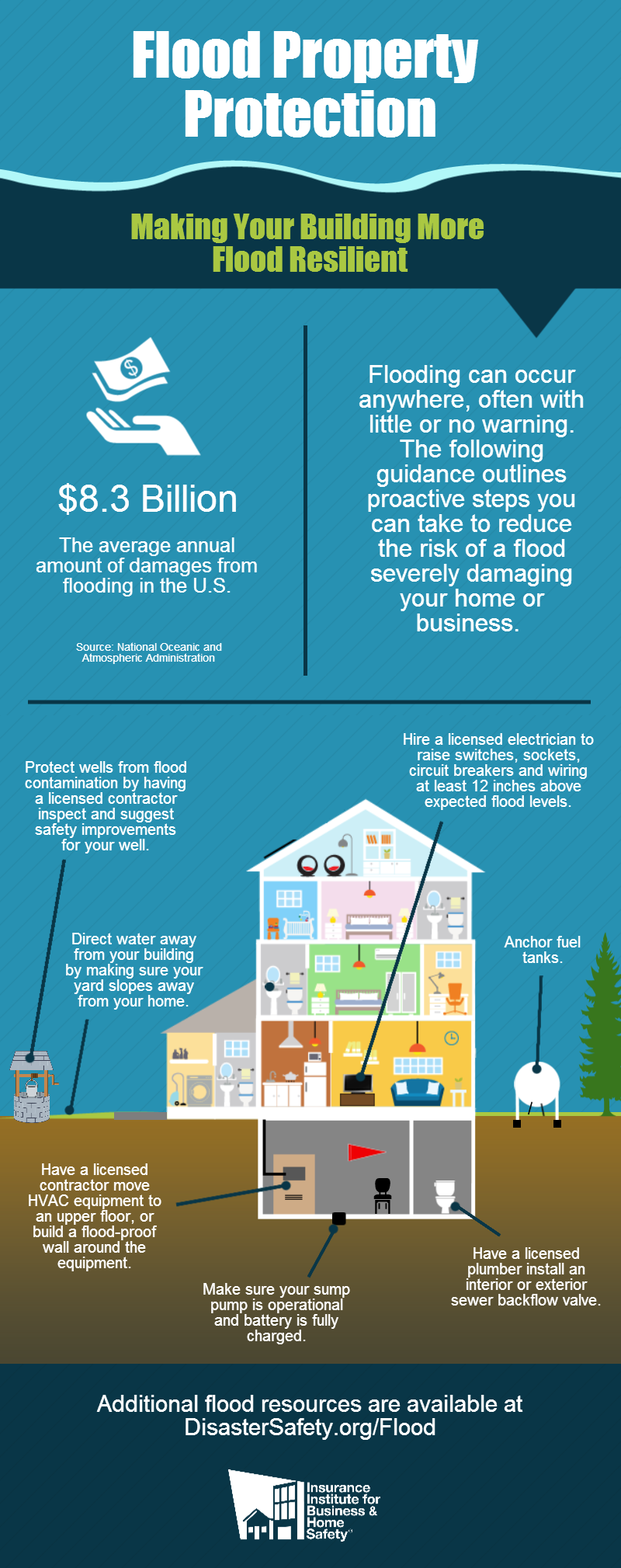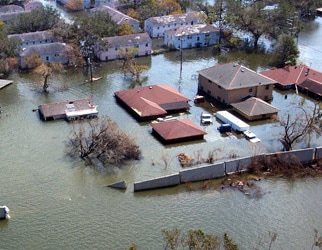|
3/26/2017 0 Comments FLOODS AND YOUR LIVESTOCKFloods can impact animal health as well as human health. Make plans for your livestock and horses in the event you will need to evacuate your farm.
Before a Flood • Maintain an inventory. □ Keep a current list of all animals on your farm. □ Include their location and any records of vaccinations, testing and ownership. • Have identification for all animals. □ Make sure animals have some form of permanent identification (e.g., ear tags, tattoos). □ Ensure animals are properly vaccinated before exposure to floodwaters. • Prepare an evacuation kit. □ Handling equipment (e.g., halters, nose leads) □ Water, feed, and buckets □ Medications □ Tools and supplies needed for manure cleanup □ Safety and emergency items for your vehicles and trailers □ Gas powered generators • Make evacuation arrangements. □ Determine possible evacuation areas – higher elevation, alternate production facilities (e.g., temporary milking parlors). □ Determine several routes to these locations. □ Identify alternate water or power sources. □ Locate and prearrange feed and water delivery, needed equipment (e.g., milking) and services (e.g., milk pickup). □ Have well maintained backup generators for livestock production operations. □ Make transport arrangements (e.g., trucks, trailers) with experienced handlers and drivers. □ Condition animals to being loaded and transported. • Ensure a safe environment. □ Assess the stability and safety of barns and other structures. □ Remove dead trees or objects from fields or livestock areas that may serve as potential debris during a flood situation. During a Flood • Be aware animal behavior may change before, during and even after a disaster. □ If you must evacuate, ensure your family’s safety first □ If there is time - move or evacuate livestock and horses to higher ground. AVOID leaving animals behind. □ If there is no other alternative, keep gates or buildings open so they can escape high water. □ Provide access to safe free-choice food source, clean water and the safest living areas possible. □ Do not rely on automatic watering systems, because power may be lost. □ Establish escape routes to safe locations (higher elevation). □ Place your contact number and the name and number of your veterinarian on the building. After a Flood • Assess your animals and building structures. □ Survey damage to your barns and other structures; assess the stability and safety. □ Examine your animals closely; contact your veterinarian if you observe injuries or signs of illness. • Return animals only after the threat has passed and the safety of buildings or the area has been assessed. □ Release animals in a safe and enclosed area until familiarity of the surroundings can occur. • Provide non-contaminated feed or water. □ Provide clean, uncontaminated water. □ Do not feed flood damaged or moldy feed or hay. □ Do not use any feed or forage that may have been contaminated by chemical or pesticides. • Animal disposal. □ Record any animal deaths. □ Check with your state or local authorities for proper disposal methods for animal carcasses. • Prevent illness. □ Keep animals away from flood waters which may contain harmful bacteria or chemicals. □ Monitor animals daily for signs of illness.
0 Comments
After the flood waters recede and the clean up has been done, most folks want to get back into their homes or businesses and start rebuilding. The problem is that wood that has been submerged in water has likely absorbed a large amount of water. Rebuilding too quickly after a flood can cause continuing problems such as mold growth, insect infestations, and deterioration of the wood and wall coverings.
Flood waters are not clean water; therefore, most porous building materials must be removed and replaced with new materials. Caution!
1. Flood Insurance Claims If you have flood insurance, contact your insurance adjuster immediately.
Be sure all electric and gas services are turned off before entering the premises for the first time.
Until your local water company, utility, or public health department declares your water source safe, purify your water, not only for drinking and cooking, but also for washing any part of the body or dishes.
Remove all furniture, bedding, and carpeting to outdoors to be cleaned and dried (or discarded).
Open flooded walls, even if they appear undamaged, to prevent mold, odor, and structural decay later.
1. Subfloors
To reduce mold and damage, clean and dry as soon as flood waters recede. Do not sand or scrape lead-based paint.
Clean and dry the submerged household appliance before starting.
Take furniture outdoors to clean.
Aggressively control mold in the weeks and months after the flood.
Avoid disturbing and spreading mold spores indoors. Clean mildewed items outdoors. Learn and take precautions to minimize exposure to mold.
|
Insurance InfoFor all the latest up to date insurance rates for Cape Cod, MA. CategoriesAll 5 Ways To Prevent Your Basement From Flooding Arbella Insurance Auto Insurance Bad Weather Driving Best Boat Insurance Best Car Insurance Best Insurance Best Policy Bourne Flood Insurance Bourne Home Insurance Buildings Buildings And Content Insurance Cape Cod Boat Cape Cod Flood Insurance Cape Cod Home Cape Cod Home Insurance Cape Cod Home Insurance Best Cape Cod Home Insurance Marthas Vineyard Insurance Falmouth Home Insurance Mashpee Home Insurance Cape Cod Home Insurance Falmouth Home Insurance Cape Cod Real Estate Cape Cod Home Insurance Falmouth Home Insurance Cape Cod Real Estate Universal Home Cape Cod Home Insurance Falmouth Home Insurance Cape Cod Real Estate Universal Home Universal Property Cape Cod Insurance Agency Home And Auto Insurance Car Insurance Car Owner Guides Centerville Home Insurance Home Insurance Agent Cape Cod Insurance Agent Cape Cod Insurance Agency Home And Auto Insurance Coastal Agents Alliance Community Outreach Contents Contents Insurance Dennis Home Insurance Yarmouth Home Insurance Vineyard Haven Home Insurance Nantucket Home Insurance Disability Safety Disaster Safety For People With Disabilities: What To Do When Emergency Weather Strikes Do I Need Flood Insurance Driver Safety Driving To Safety: The Car Owner's Guide To Emergency Evacuation Emergency Evacuation Emergency Evacuation Preparedness Falmouth Flood Insurance Falmouth Home Insurance FEMA Flood Program Flash Flood Safety: 5 Must Ask Questions Flash Flood Safety: 5 Must-Ask Questions Flood Flood Damage Flooding Flood Insurance Flood Insurance Costs Flood Insurance Rates FLOODS AND YOUR LIVESTOCK Guide Guide To Safe Driving Home Home And Car Insurance Home Insurance Home Insurance Agent Cape Cod Insurance Agent Cape Cod Insurance Agency Home And Auto Insurance Home Insurance Cape Cod Home Insurance Best Cape Cod Home Insurance Marthas Vineyard Insurance Falmouth Home Insurance Home Insurance Cape Cod Home Insurance Best Cape Cod Home Insurance Marthas Vineyard Insurance Falmouth Home Insurance Mashpee Home Insurance Sandwich Home Insurance Bourne Home Insurance North Falmouth Home Insurance Marion Home Insurance Household Insurance Information & Resources Insurance Insurance Emergency Strikes' Insurance Flood Insurance Policy Maps: Which Parts Of The U.S. See Flash Floods Most Often? Marion Home Insurance Plymouth Home Insurance Dennis Home Insurance Yarmouth Home Insurance Mashpee Flood Insurance Mashpee Home Insurance Mashpee Home Insurance Sandwich Home Insurance Bourne Home Insurance North Falmouth Home Insurance Narragansett Insurance National Flood Insurance Program Plymouth Home Insurance Dennis Home Insurance Yarmouth Home Insurance Vineyard Haven Home Insurance Nantucket Home Insurance Yarmouth Home Insurance Possessions Preparing For Vehicle Emergencies Prevent Flooding Replace Right Insurance Safe Driving Guides Safety Guide Safety Guides Tags: Safety Safety Insurance Sandwich Home Insurance Sandwich Home Insurance Bourne Home Insurance North Falmouth Home Insurance Marion Home Insurance Plymouth Home Insurance The Ultimate Guide To Hurricane Facts Universal Home Universal Property UPC Insurance MPIUA Mass Property Fair Plan Fair Plan Alternative Universal Insurance Universal Property UPC Insurance MPIUA Mass Property Fair Plan Fair Plan Alternative UPCIC Insurance UPC Insurance UPC Insurance MPIUA Mass Property Fair Plan Fair Plan Alternative Vehicle Emergency Kit Vehicle Safety Vineyard Haven Home Insurance Nantucket Home Insurance Yarmouth Home Insurance Centerville Home Insurance Water Damage Wind Vs. Hurricane Deductibles Wright Flood Yacht Insurance Yarmouth Home Insurance Centerville Home Insurance Home Insurance Agent Cape Cod Insurance Agent Archives
June 2021
|
-
HOME
- Cape Cod, MA - Send me a Home Quote
- Cape Cod, MA Home Insurance Protection
- Arbella Insurance Discounts
- Lloyds of London History
- Safety Insurance Discounts
- Cape Cod Massachusetts - Alternative to MPIUA - MA Property Insurance Underwriting Association "Fair Plan"
- Cape Cod Real Estate
- Hurricane Preparedness
- Hurricane Survival
- Hurricane Aftermath
- FLOOD
- Cape Cod Home Insurance
- AUTO
- BOAT
- BUSINESS
- LIFE
- OFFICES
- ABOUT US
- eServices
- Agent Login
- Contact Us
- Privacy Policy
-
HOME
- Cape Cod, MA - Send me a Home Quote
- Cape Cod, MA Home Insurance Protection
- Arbella Insurance Discounts
- Lloyds of London History
- Safety Insurance Discounts
- Cape Cod Massachusetts - Alternative to MPIUA - MA Property Insurance Underwriting Association "Fair Plan"
- Cape Cod Real Estate
- Hurricane Preparedness
- Hurricane Survival
- Hurricane Aftermath
- FLOOD
- Cape Cod Home Insurance
- AUTO
- BOAT
- BUSINESS
- LIFE
- OFFICES
- ABOUT US
- eServices
- Agent Login
- Contact Us
- Privacy Policy
Search by typing & pressing enter







 RSS Feed
RSS Feed
